By Vicky Bennett / GMS Coordinator
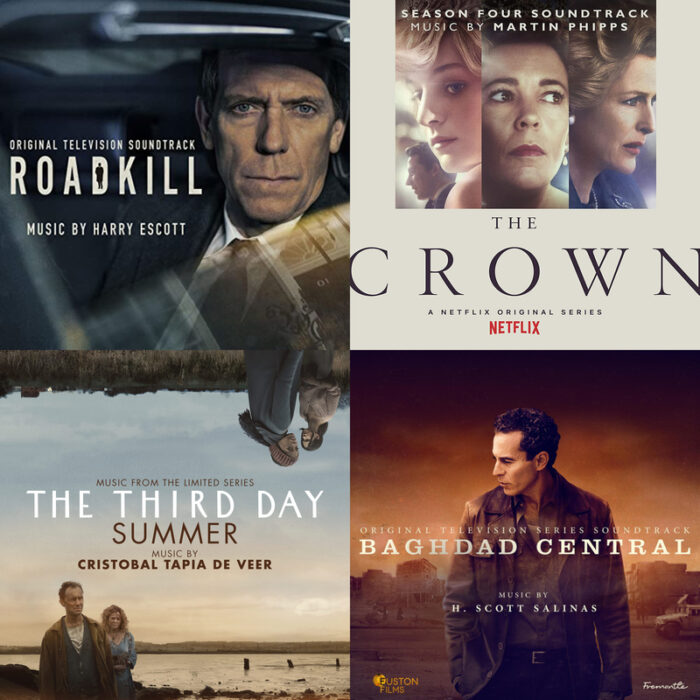
The BAFTA Television Craft Awards took place on the 24th of May and firstly we would like to say congratulations to all the nominees for making it this far, who have been a pivotal part in creating music for each of the various series!
A huge congratulations to the Winner, Harry Escott for his Original Score on Roadkill.
In light of this, we had the absolute pleasure to speak with all the incredibly talented Composers nominated for ‘Original Score’ to get a deeper understanding of their work on each of the series listed and expand once again on ‘Composers Corner’.
We spoke to the following Composers:
Harry Escott
Roadkill -The Forge Entertainment/BBC One
Cristobal Tapia de Veer
The Third Day (episode 3)- Sky Studios, Plan B Entertainment, Punchdrunk Entertainment, HBO/Sky Atlantic
H. Scott Salinas
Baghdad Central – Euston Films/Channel 4
Martin Phipps
The Crown- Left Bank Pictures in association with Sony Pictures Television/Netflix
Our first interview features Harry Escott to get a better understanding of his work on the award-winning soundtrack, Roadkill.
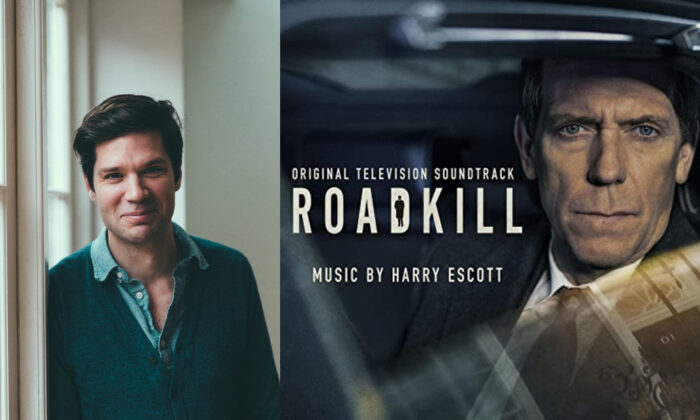
Within a couple of hours, Michael called back and told me he wanted me to compose the score. I was delighted, the scripts had really drawn me in and the tone of the show was exciting to me!
Vicky: How did you come to be involved with Roadkill and what was it that drew you towards working on the series?
Harry Escott:
Remembering meeting Michael Keillor (the director) for the first time still makes me cringe a little. I thought I had fluffed it and went home feeling very despondent. I sat down at the piano and started messing around and a sort of wonky waltz began to take shape – it really was a subconscious thing, a bit of noodling, but I realised that it was a response to the Roadkill scripts so I pressed record and sent off a very rough mp3 of my dodgy piano playing. Within a couple of hours, Michael called back and told me he wanted me to compose the score. I was delighted, the scripts had really drawn me in and the tone of the show was exciting to me – at its core, Roadkill is a very dark and bleak observation but it’s done with humour, mischief and a breeziness which I thought was unusual and beguiling.
Vicky: How do you feel that the music you composed for the main title of Roadkill, played an integral part in accompanying the audience with what they were about to watch?
— Is there a certain process you go through to ensure that the music in both the opening and end sequence best represents the sound you want to illustrate for the overall tone of the series?
Harry:
The function of opening titles music is very different from end credits music. For Roadkill, we had a different piece of music to close each episode which makes sense because, for me, at the end of a story it is all about holding people in the same space and allowing them a few seconds to reflect on what they have just experienced – so it’s an extension of the score really. The opening titles is a bit more tricky, specifically for television. On the one hand, it needs to be a musical reflection of the show so that it allows the viewer a way in to what they are about to watch but, on the other, it has to sell the show and often those two things aren’t perfectly aligned. Opening credits sequences for films don’t have that pressure – you just focus on whether the music sets up the tone of the film or prepares an audience appropriately but with television, the dialogue often moves away from the director and over to the producers at that point and talk of “which channel…what the audience is likely to be…what time it is airing…” creeps in…so it’s a different beast!
Vicky: How did you interpret what the director, Michael Keillor, wanted from a scene?
Harry:
Michael was very clear from the beginning that he didn’t want underscore, in fact, he didn’t want the music to follow or score the drama specifically at all: he wanted a tune and he wanted it to play alongside the visuals. “Put those interesting drones away. Give me a tune, Harry!” he would shout jovially down the phone to me. It took me a while to find what he was after – my initial offerings were still too emotionally “zoomed in”, but then I realised that by ignoring the specifics of what is happening on screen we become much more aligned with the viewpoint of our central character, Peter Lawrence, played by Hugh Laurie. He is a sociopath, who is very good at pretending to care for and about those around him, but, in reality, he only cares about winning. And so, adding music which doesn’t get bogged down in mirroring the emotions of a scene helps us see things from his point of view: “how am I going to manage this to make me look good?” In any event, that is all he is thinking about – an alarmingly effective way of getting ahead, which I suppose is one of the darker and more bleak questions that the drama poses: is that attitude / nature a prerequisite for success in our world?
Vicky: Can you talk a little about your role throughout the writing process? Are there any highlights for you looking back on the work?
Harry:
Seeing the smiles on the musicians’ faces as they walked into Air Studios in May last year was lovely: we were still in the depths of the first lockdown at the time and it was the first session at Air for a couple of months. We really pushed hard to record this properly and I am so glad we did. Having musicians in a room with the composer and the director makes a huge difference. Being able to feedback and instantly hear the results and then keep going back and forth was a key part of the process for this score and to do that without everyone being together in a room would not have worked. I realise that this is not a very fashionable thing to say right now when we are all trying to pretend that remote working is fine, but I actually think it is a hugely positive thing to admit that for some things, it is far better to be in a room together and I can’t think of a better example then making music.
Thank you Harry, for taking the time out to speak with us!
You can listen to the full OST below:
Next we had the wonderful opportunity to speak with Cristobal Tapia de Veer to get a deeper understanding for his work on The Third Day.
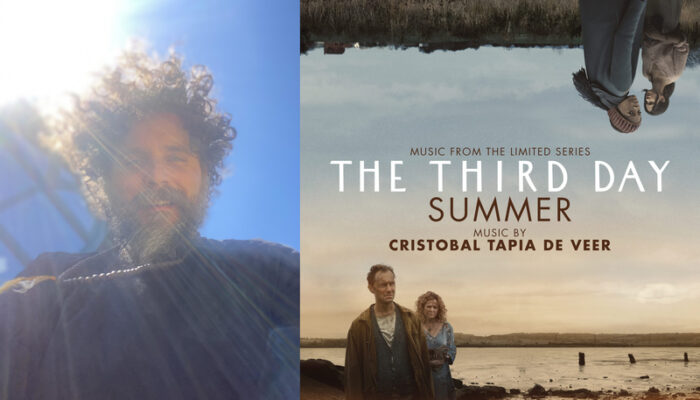
The melodies for the orchestral part I sung into my phone, while out in the forest, the Laurentian Mountains, far from civilization. I wanted to capture a sense of being lost or isolated while increasing the feeling of connecting to nature and to the subconscious mind.
Vicky: How did you come to be involved with The Third Day and what was it that drew you towards working on the series?
Cristobal Tapia de Veer:
Director Marc Munden asked me to do it. I was interested in the political subtext, mainly, the references to Brexit, Trump’s America, cults and racism that were in the script.
Vicky: Understanding that this series was split into three interconnected parts, ‘Summer’ ‘Autumn’ and ‘Winter’, how did you interpret ‘Summer‘ and what was the sound you wanted to illustrate for the overall tone of this, to the audience, through the story and characters in this sequence?
Cristobal:
I wanted to illustrate the dialogue between Sam (main character) and Osea (the island, a character on its own), which basically defines the main character’s inner struggles but leaving it open to interpretation. What’s happening could actually be happening for real, not only in his head. There is the emotional score (strings), fragile vocals, acoustic guitars, simple melodies, which connect the main character’s grief and healing process to the way he imagines things… The melodies for the orchestral part I sung into my phone, while out in the forest, the Laurentian Mountains, far from civilization. I wanted to capture a sense of being lost or isolated while increasing the feeling of connecting to nature and to the subconscious mind.
Another part is the wild score, atonal and brutal, which is or could be what’s actually happening in this world.
Vicky: How did you interpret what the director, Marc Munden, wanted from a scene?
Cristobal:
Emotionally, it’s the only way to interpret what anybody wants, I think.
Vicky: Can you talk a little about your role throughout the writing process? Are there any highlights for you looking back on the work?
Cristobal:
I always work to get in character, so to speak. For this I experimented a lot in the forest, recording instruments or finding sounds, even the programming part was done on a laptop in the woods, as it can be an unfriendly place, certainly more adequate and conducive to creativity than a professional recording studio. That being said once that was composed, the orchestral parts were recorded in a proper studio.
Thank you Cristobal, for taking the time out to speak with us!
You can listen to the full OST below:
In our next interview we had the incredible opportunity to speak to H. Scott Salinas who walks us through his work on Baghdad Central.
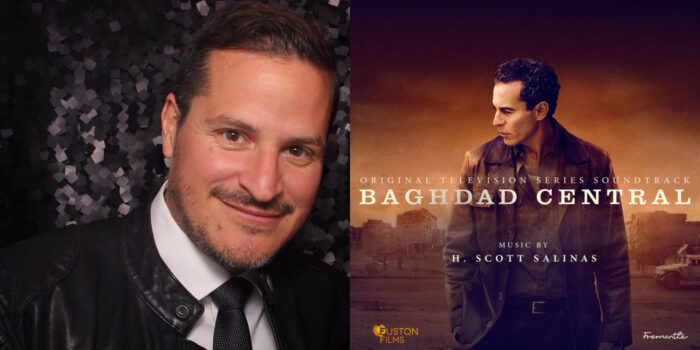
One of my favourite parts of working on this score was travelling to Ouarzazate, Morocco to the actual set of the show. …besides being a fly on the wall I was able to do field recordings on-site and capture the raw essence of the show as it was coming together.
Vicky: How did you come to be involved with Baghdad Central, and what was it that drew you towards working on the series?
H. Scott Salinas:
Alice had heard my work on City of Ghosts, a documentary that takes place in the Middle East, and reached out for me to audition through my agent at WME. For the audition, I read the scripts of the episodes and then was asked to sketch out a piece with my interpretation of what the music of the series might entail. I was immediately drawn to the tone of the scripts. While the setting was clearly important (Iraq during the US occupation), there was also this really interesting detective component which was really unexpected and piqued my interest and in turn, fueled my early creative process. In the end, my submission really resonated with Alice and the rest of the team and so luckily I was awarded the job.
Vicky: How do you feel that the music you composed for the main title of Baghdad Central, plays an integral part in accompanying the audience with what they were about to watch?
— Is there a certain process you go through to ensure that the opening sequence best represents the sound you wanted to illustrate for the overall tone of the series?
Scott:
Actually the main titles are derived directly from my original audition demo. Alice sent me two references prior to the audition, 1) a metal worker in Baghdad banging intently on a piece of metal with a mallet as he molded it into shape. 2) An old school film noir song from the 60s.
Alice was very clear that she thought the visceral essence of Baghdad coupled with classic detective music would be the perfect amalgamation for the score and would properly encapsulate the tone of the scripts. I humbly accepted the challenge and took it very seriously and low and behold I think those two references are quite clear in the main titles. The idea was that at the end of the day while the setting was crucial to the story it was also a detective story and we wanted to play on those classic tropes of mystery and the smartest person in the room uncovering that which no one else can.
Vicky: How did you interpret what the director, Alice Troughton, wanted from a scene?
Scott:
Alice was always very clear on the story, mood, and character. And she managed to capture the story so expertly that it was quite clear what was needed. The hardest part of the score was capturing the tone but since we managed to do that essentially from the outset, it was a pretty smooth process to tell the story through that filter. We always had to be cognizant to maintain the balance of the detective story which has a sort of tongue in cheek quality and the ever-increasing stakes of the story.
Vicky: Can you talk a little about your role throughout the writing process? Are there any highlights for you looking back on the work?
Scott:
One of my favourite parts of working on this score was travelling to Ouarzazate, Morocco to the actual set of the show. The team was very generous to send me out there and besides being a fly on the wall I was able to do field recordings on site and capture the raw essence of the show as it was coming together. Once I was back in my studio in Los Angeles, I was able to channel that feeling I had on the ground in the desert and utilize some of those sounds that I captured which really gave me the confidence that I was on the right track and that I was part of the creative process not just musically but as a storyteller.
Thank you Scott for taking the time out to speak with us!
You can listen to the full OST below:
Lastly, we had the absolute pleasure to speak with Martin Phipps about his iconic work on The Crown, season 4.
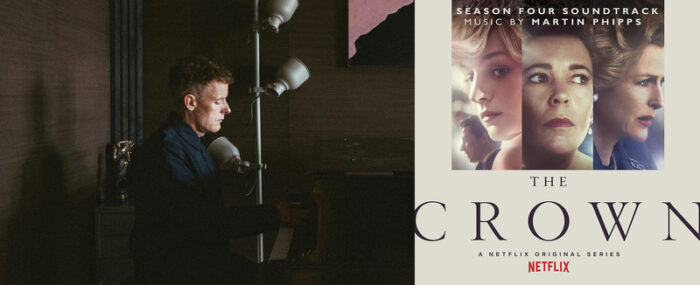
With the arrival of such strong new characters, and the shift to the vibrant 80’s the action demanded substantial new material, so the challenge was to make the new season feel fresh & updated.
Vicky: How did you come to be involved with The Crown and what was it that drew you towards working on the series?
Martin Phipps:
I met with the show runner Peter Morgan shortly after the 2nd season dropped on Netflix in 2017. He told me that, with the recasting of the show in Season 3, they wanted to try a different approach with the music. A more minimal, less bombastic approach, that hit hard emotionally & really dug under the skin of the main characters. To be honest, I was sceptical about not starting a series from the beginning & nervous about taking over from Rupert Gregson Williams & Lorne Balfe, who did an exceptional job on the first 2 seasons. However Peter assured me that he genuinely wanted something different, and that he thought I was the right person to deliver that.
Vicky: Anything different, in general, about your musical approach from Season 3 to Season 4?
Martin:
Peter Morgan was keen to keep a sense of continuity. We worked hard in Season 3 to build up a new body of sound/themes, but inevitably, with the arrival of such strong new characters, and the shift to the vibrant 80’s the action demanded substantial new material. So the challenge was to make the new season feel fresh & updated, while dropping in echoes of season 3 at regular intervals.
Vicky: How did you interpret what each of the directors, Benjamin Caron, Paul Whittington, Jessica Hobbs and Julian Jarrold, wanted from a scene?
Martin:
Although I loved working with all these directors, and had some great steers from them over certain moments, they were often too tied up either filming, or engaged in the long & detailed edit that takes place for each episode on The Crown, so the main overall musical direction/decisions came from Peter himself.
During the opening weeks of the shoot, I wrote him an albums worth of new themes for Season 4. His reactions were instant & visceral – broad brush strokes – and he would divide them into “Love that” “Absolutely hate that, don’t let that near our show” and “Mmm not sure lets see”. After that, Peter worked closely with the editors & directors about which themes went where in the episodes. Once the edit of the episodes were pretty much finished, they were sent back to me, with most of the main themes roughly in place, and I would then develop, finesse & in some cases re-record teach cue.
Vicky: Can you talk a little about your role throughout the writing process? Are there any highlights for you looking back on the work?
Martin:
The highlight of last season was getting back into the studio with some players, in the brief break in lockdown last summer. Composing for film & tv is a lonely job – most of my days are spent staring at a blank computer screen or keyboard, hoping something will come to me – and this was only made worse by COVID – so the chance to be back in the room with real people was fantastic.
Thank you Martin, for taking the time out to speak with us here at GMS!
You can listen to the full OST below:
Thank you to each composer for taking the time out to speak to us here at GMS about your work on each of these shows. We wish you the best in all of your future projects!
